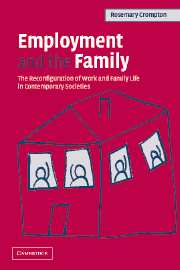Book contents
- Frontmatter
- Contents
- Preface
- 1 Understanding change in employment, family and gender relations
- 2 Caring and working
- 3 Women, men, organisations and careers
- 4 Work–life articulation, working hours and work–life policies
- 5 States, families and work–life articulation
- 6 Households, domestic work, market work and happiness
- 7 Class, family choices and women's employment
- 8 Conclusions
- Appendix A Additional ISSP Family 2002 questions
- Appendix B Joseph Rowntree Foundation (JRF) interviewees cited
- Bibliography
- Index
4 - Work–life articulation, working hours and work–life policies
Published online by Cambridge University Press: 22 September 2009
- Frontmatter
- Contents
- Preface
- 1 Understanding change in employment, family and gender relations
- 2 Caring and working
- 3 Women, men, organisations and careers
- 4 Work–life articulation, working hours and work–life policies
- 5 States, families and work–life articulation
- 6 Households, domestic work, market work and happiness
- 7 Class, family choices and women's employment
- 8 Conclusions
- Appendix A Additional ISSP Family 2002 questions
- Appendix B Joseph Rowntree Foundation (JRF) interviewees cited
- Bibliography
- Index
Summary
Introduction: the story so far
In previous chapters, we have examined in parallel a series of developments relevant to the articulation of employment and family life. The economic and normative changes associated with the emergence of the ‘modern’, male-breadwinner family in Britain have been reviewed, together with its slow erosion and decline. We have charted women's progress towards formal equality with men, and the associated increase in women's employment, particularly that of mothers. The role of ‘preferences’ and gendered moral rationalities in shaping mothers' employment practices has been critically examined. Changing attitudes to the family, and gender roles, have been reviewed, and the class and gender variations in these attitudes described. Finally, we have addressed the issue of contemporary employment and workplace change, and its implications as far as both family arrangements and women's aspirations for promotion are concerned.
A number of different themes have emerged. The significance of individual ‘choice’ has been recognised but it has been emphasised that ‘choices’ are constrained by the (rather different) inequalities of gender and class. Women's claims to gender equality have been largely accepted, and there is widespread support for more egalitarian gender roles. However, even though women may have had their equal status, as individuals, recognised as legitimate, there are nevertheless persisting normative assumptions relating to gendered responsibilities for care work (even though ‘choice’ may indeed play its part in the take-up of these responsibilities).
- Type
- Chapter
- Information
- Employment and the FamilyThe Reconfiguration of Work and Family Life in Contemporary Societies, pp. 89 - 114Publisher: Cambridge University PressPrint publication year: 2006

